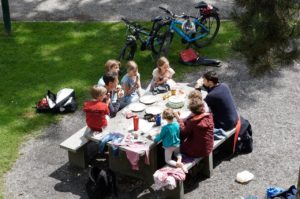Planning a safe picnic requires a good amount of preparation. It’s important to make sure you have the essentials packed to take with you. Below is a checklist along with a description on why that item is important to keep your picnic safe.
- Food Thermometer
- Cold food needs to be at or below 40° F, hot food should be kept at or above 140° F and your food needs to be cooked to the proper internal temperature (burgers 160° F, chicken 165° F, and pork 145° F).
- Ice Chest Coolers
- Plenty of ice is needed in the cooler to keep contents cold. Organize contents so beverages are in one cooler and perishable food is in another. This way your food is not exposed to warm air as people reopen coolers to get their drinks. Coolers should be kept in the shade and limit the times they are open to keep the contents cold longer.
- Plenty of Clean Utensils
- This is to ensure that there is no cross-contamination. Utensils or platters used to touch or store raw meat should not be used for cooked meats. The juices from the raw meat contain bacteria that can spread to your cooked food. Use clean utensils for cooked meat and make sure each dish at the picnic has its own serving spoon.
- Extra Containers
- These can serve a couple of different purposes. If you will be having cold salads like potato or macaroni, you can sit them directly on ice that’s in one of the extra containers to keep it at the proper temperature. The second purpose for the containers is to store leftovers. Your food should not sit out for more than 2 hours, or 1 hour if the temperature is above 90° F. If your food is getting close to that time frame you can use the extra containers to put your leftovers in to store in a cooler. This will save you from having to throw all of the food out.
- Paper Towels
- Not only are paper towels handy to have after washing your hands but they are also good to have for cleaning up messes or drying off cleaned produce. If your facility doesn’t have running water, then you will also need to bring a water jug and soap for washing your hands.
- Trash bags
- Not every facility is going to have a trash can. It is a good idea to bring extra trash bags in case there isn’t a place for you to put your trash or you’ve fill up the designated can. This will help keep the garbage from contaminating your food or any equipment you might be using. Garbage also creates odors and can attract pests and no one likes uninvited guests.


